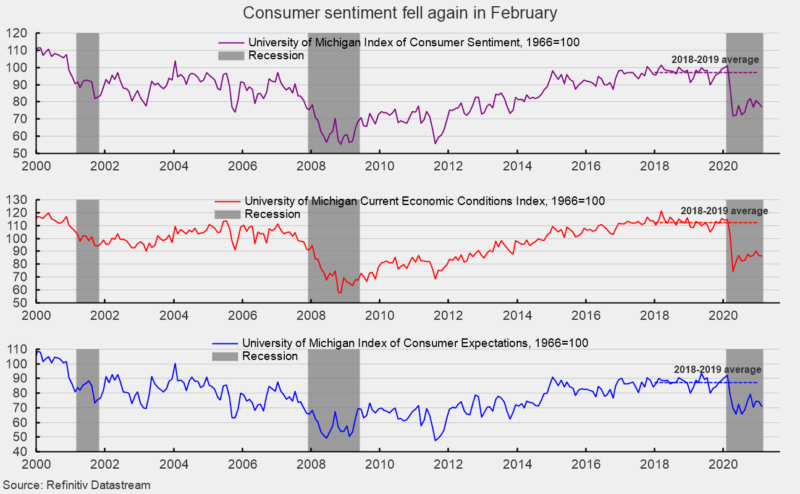Lower Income Households Pull Down Consumer Sentiment in February
The final February results from the University of Michigan Surveys of Consumers show overall consumer sentiment fell in February and remains well below pre-lockdown levels. Lower income households were the primary group responsible for the decline.
Overall consumer sentiment decreased to 76.8 in February, down from 79.0 in January, a 2.8 percent decline (see top chart). From a year ago, the index is down 24.0 percent. The sub-indexes both fell in February though the drop in expectations was much more significant. The current-economic-conditions index dropped to 86.2 from 86.7 in January (see second chart). That is a 0.6 percent decline and leaves the index with a 24.9 percent decrease from February 2020. The second sub-index — that of consumer expectations, one of the AIER leading indicators — sank 3.3 points or 4.5 percent for the month to 70.7 (see third chart) and is 23.2 percent below the prior year.
All three indexes remain well below the pre-pandemic levels, with the Current Economic Conditions index 23.4 percent below its 2018-2019 average and the Index of Consumer Expectations 19.0 percent below the recent average. Combined, the overall index sits 21.0 percent below the pre-pandemic average.
According to the report, “All of February’s loss was due to households with incomes below $75,000, with the declines mainly concentrated in future economic prospects.” The report goes on to add, “The worst of the pandemic may be nearing its end, but few consumers anticipate the type of persistent and robust economic growth that restores employment conditions to the very positive pre-pandemic levels. The recent revival in spending has been driven by drawdowns in precautionary savings. Interestingly, those with a college degree were more cautious about prospects for the national economy until just a few months ago. In contrast, those with less than a college degree recorded the least favorable economic prospects in this month’s survey, indicating the high cumulative toll of the pandemic. It is a common occurrence that groups that had suffered the least in a recession are the first to propel the economy forward, although it is true that those whose jobs were in the hardest hit sectors will be the slowest to fully recover.”
Government restrictions on consumers and businesses remain a significant threat to the outlook for economic growth. The development and distribution of vaccines is a very positive factor and should eventually lead to sharply less government restrictions. In the meantime, the longer the virus continues to spread (along with the possibility of mutations prolonging the outbreak), consumers remain restricted, and businesses remain closed or limited, the more uncertain a labor market recovery becomes and the higher the probability of financial hardships contributing to a slow and drawn-out economic recovery.






